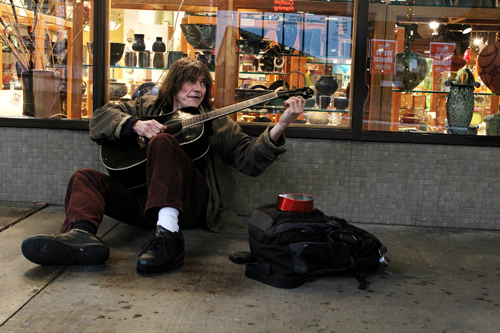Guitarist Bruce Windham’s fingers were red and chapped from his time spent in the cold, but they still danced through the chords of Robert Johnson’s “Crossroad Blues” with a veteran’s precision. There weren’t many onlookers on that rainy afternoon, but he kept his spirits high and played on.
Playing through the pain

Guitarist Bruce Windham’s fingers were red and chapped from his time spent in the cold, but they still danced through the chords of Robert Johnson’s “Crossroad Blues” with a veteran’s precision. There weren’t many onlookers on that rainy afternoon, but he kept his spirits high and played on.
“You almost have to be like a yogi master,” explained Windham when asked about street performance in the winter. “You have to keep playing while your fingers feel like they’re on fire from the cold.”
Windham is one of the many street musicians—also known as buskers—enlivening Portland’s downtown blocks. Rain or shine, they make a hard living as they reach the ears of passersby that are often too busy or distracted to stop and enjoy their musical offerings. From folksy guitarists to bands of bucket drummers, they collectively lend a breadth of talent to the heart of the city.
But some buskers fare better than others, particularly during the winter months.
“People are just in a hurry to get someplace warmer, so they don’t stick around to listen, or they don’t want to take their glove off to reach into their pocket,” Windham said. “Or maybe they just think there’s a desperation factor when you’re playing in the rain.”
The persistent rain worked against the nearby bucket drummer as well.
“All this rain just eats up your sticks,” said Roby Williams, as he wrapped up his bucket drumming performance near Pioneer Place. A police officer had just demanded that he move his kit from the overhang under which he’d set up shop, putting him out in the rain.
Asked about his interaction with the officer, Williams shrugged and maintained his position: “Every cop is different,” he said. “Some are all right. Some will fake a noise complaint.”
He said that, overall, police oversight is “definitely a lot tighter than it used to be.”
While Williams was the only drummer present at the time, he explained that normally several others are around, sharing beats and forging rhythms around Pioneer Place. Sometimes they even collaborate with other musicians on the block.
“There’s a guy that sometimes plays down the street that I jam with, who is really great on a guitar,” Williams said. “He used to play for some big names and shit, way back.” The guitarist to whom he was referring is, in fact, Windham.
But not all encounters between buskers are so neighborly. Both Windham and Williams pointed to heated competition for “performance real estate.” Sometimes, according to Williams, it can even get violent.
“Corner disputes can definitely get hot,” Williams said.
Fortunes seemed to favor the drummer’s location of choice. Situated along the streets conjoining the MAX rail routes, there is often a steady flow of traffic, even on slower days.
On a previous night, when Williams collaborated with Jordan Staples, a young hand drummer with years of street performance experience, a young woman approached the pair and asked to record them. She glowed as she thanked them, dropping a handful of cash into their bucket.
Reflecting on their success rate, Williams suggested some earning potential, despite tighter budgets and increased competition. “It can be good for $100 an hour when things are just right,” he said.
But Staples, a young man who has performed on the street since he was eight years old, said that things aren’t as good as they used to be.
“Things have gotten kind of worse, to be honest,” he said, before adding with a laugh, “But that might be because it’s easier to make money when you’re a kid.”
Still, Staples said that guitarists have it worse, especially in the cold. “Playing drums keeps the hands warm, really. It’s on the strings, where you need the fingers to work, that it gets tough.”
Windham described more hardship in his own experience.
“I played on just three strings for a while,” he said. “I would play to get enough money to go buy new strings. But it wasn’t such a big deal.”
Currently, Windham makes his living with a weathered Ibanez acoustic guitar and a repertoire of old blues, singer-songwriter folk and jazzy improv. He happily plays requests but prefers to stick to songs made for a solo guitarist. He hopes to get back to playing with others sometime soon.
“My dream is to have a little band,” he said. “Maybe a three piece—two guitars and a bass, everyone singing.”
His quiet, intimate playing contrasts sharply with the resonant burst of rhythm produced by Williams and the rest of the Pioneer drummers. Williams, who plays on a kit comprised of buckets of all shapes and sizes, pots, bottles and whatever else is within range, sees his voiceless beat-making as a soundtrack to a vibe already present.
Love them or hate them, their soundtrack makes up part of the city’s character. Onlookers have posted videos of Portland’s downtown buskters on websites such as YouTube, one of which calls them the “Sounds of Portland.”
“You’re just a transmitter of a groove,” Williams said of their music. “It’s all coming from somewhere else.”




